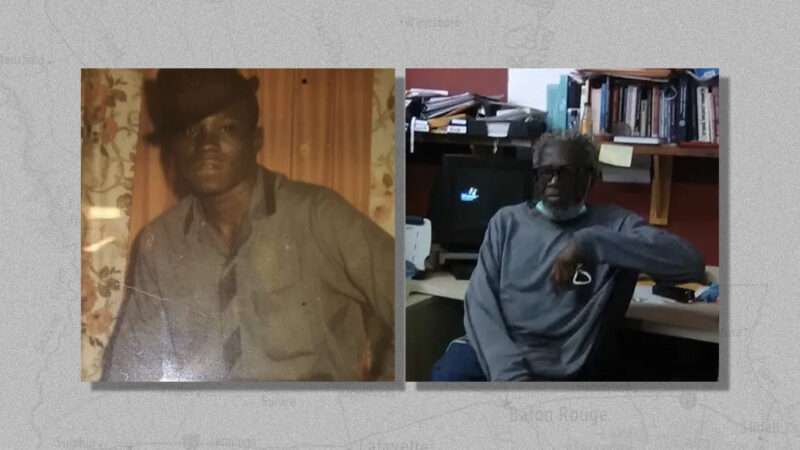
When Bobby Sneed exited the West Feliciana Parish Detention Center last month, it was the first time he'd tasted a semblance of freedom in nearly five decades. He served the bulk of that for his role in a 1974 robbery. The last nine months or so, however, were spent illegally imprisoned, after the state of Louisiana granted him parole and subsequently refused to release him despite multiple court rulings ordering the government to set him free.
That release was supposed to come on March 29 of last year. Instead it came on January 7 of this one, following a second court decision from a judge who railed into the government for perpetually violating Sneed's rights. As I previously wrote, this is a story about the lengths government agents will go to exert control over someone they have willingly admitted presents no danger to society, and how difficult it is to hold them accountable when they do so.
When he first got parole, he "was somewhat elated," Sneed says. "It'd been a long time coming."
But he'd have to wait even longer. Sneed, who turned 75 in December, collapsed in a dormitory at Louisiana State Penitentiary, otherwise known as Angola, in mid-March 2021. By that point, he'd already obtained his scheduled release date after a 17-minute hearing that returned a unanimous decision from the Louisiana Board of Pardons and Parole. But it was suddenly revoked after Sneed was hospitalized and treated for COVID-19 and pneumonia. The justification: Sneed allegedly also tested positive for amphetamine and methamphetamine. His release was officially put on hold, and as March 29 came and went, Sneed sat in solitary confinement.
Yet the drug charges against him quickly disintegrated. Prison staff admitted they had not completed a full chain of custody on Sneed's urine samples and could not verify it was actually him who had tested positive. A disciplinary committee acquitted him.
Even so, Sneed's parole revocation became official in May—during a hearing that violated state law, according to Judge Ronald Johnson of the 19th Judicial District Court. The Committee on Parole prohibited Sneed and his attorney, Thomas Frampton, from seeing the purported evidence against him and from calling witnesses.
Even more fraught, the state's case against Sneed's release relied on the doctor who treated Sneed; her notes said that Sneed admitted to using drugs. But according to Frampton, that doctor told him she didn't know why that would be in her description, because Sneed was, for the most part, unconscious and unable to communicate clearly. The state did not provide Frampton with that evidence until after the hearing, meaning he was not able to question its integrity or call the doctor as a witness to speak on the record.
The December 2021 court decision that led to Sneed's release almost didn't. "Sneed was deprived…of due process of law," wrote Judge Johnson in a stern opinion that, for the second time, ordered Sneed freed. (His first ruling demanding Sneed's release came in November.) But as Sneed was minutes away from piling into his pickup car outside Angola, the Committee on Parole re-arrested him on an unrelated contraband charge that, until he was about to reach freedom, it had not mentioned or pursued.
Another month later, the Committee finally decided to comply, stipulating that Sneed had to enroll in a 28-day drug treatment program which he finished earlier this month. Though it's likely they felt the pressure from the court, the exact reason for finally conceding remains unclear: "Thanks for the opportunity but we will not be commenting at this time," Francis Abbott, the executive director of the Committee on Parole, told me by email last week.
In 1975, Sneed was sentenced to life behind bars for his role in a botched robbery, during which one of his accomplices murdered a man he was burglarizing. Though Sneed was blocks away from the killing, he was convicted of principal to commit second-degree murder and, until last month, was the only one still incarcerated of the six involved in the crime.
It was the first time he'd been locked up, and he remains remorseful. "Of all the time I had been incarcerated, I had never given up… I continued to do what I thought was right," he says. "I always want to help others." During his long stint at Angola, Sneed worked as a legal substitute—essentially a stand-in jailhouse attorney—helping other incarcerated people work through the thicket of procedural legalese in their cases.
He's not thinking about prison any longer. "I have a lot of grandkids that I don't even know yet, and I just want to put all of this behind me," Sneed says. "The rest of the time I got on this earth I'm going to spend it with my family." One of the grandsons he does know is Kansas City Chiefs cornerback L'Jarius Sneed, who, as Sneed puts it, "wants to spend a lot of time with his papaw."
But his legal odyssey may not have reached its final denouement, should Sneed decide to file a civil suit against the government for the violation of his constitutional rights. "It's profoundly worrisome," says Frampton. "The sheer number of state actors…working to prolong Bobby's unconstitutional detention is disturbing."
Though many government agents worked to secure Sneed's post-parole imprisonment—from Attorney General Jeff Landry to Angola Warden Tim Hooper—the primary player was arguably Abbott. In a court filing, the government asserted that Sneed "failed to allege or show that Director Abbott possessed any actual statutory authority to take any official action" in Sneed's case. Abbott's emails, now released, tell a different story, with what appears to reveal him ordering the move and then apprising his colleagues of it.
I asked Sneed what he'd say to Abbott and company given the chance. "I would just…pray for them," he responds. "I keep them in my prayers."
The post After Being Illegally Imprisoned for Almost a Year, Bobby Sneed Is Finally Free appeared first on Reason.com.







